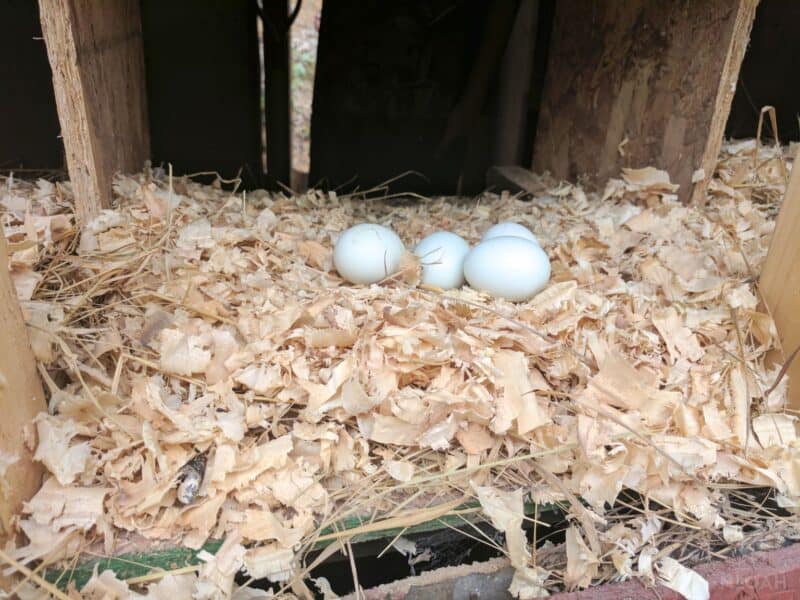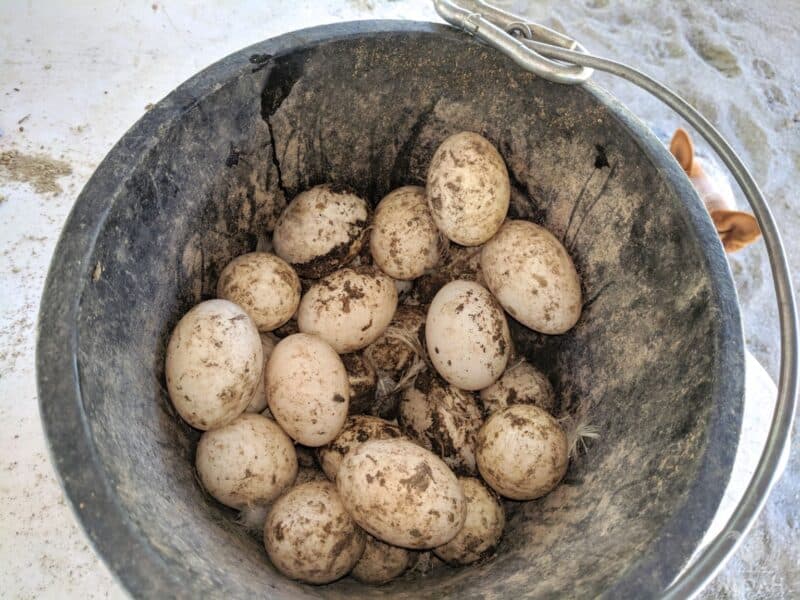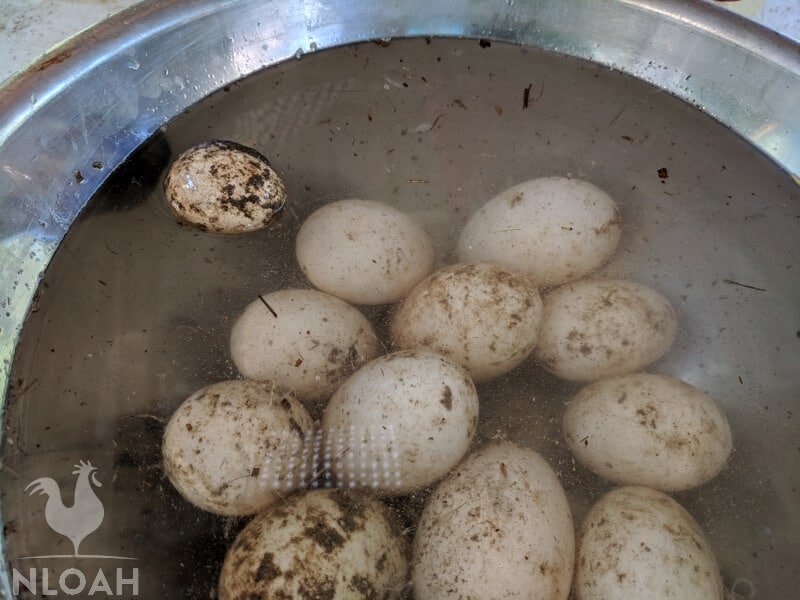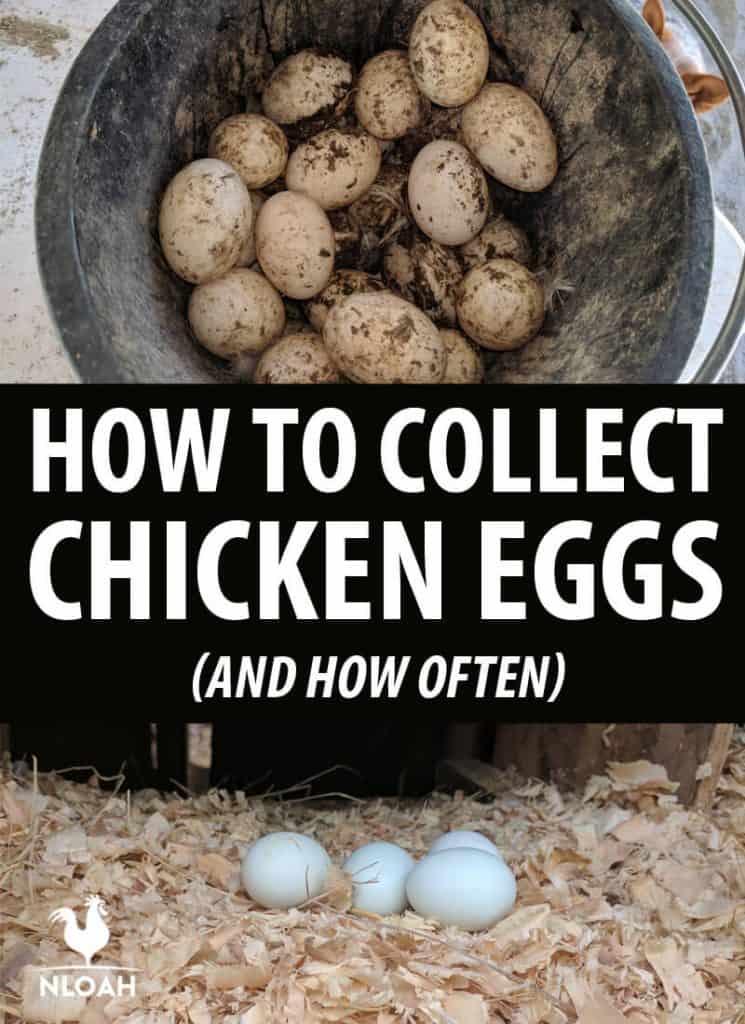In any television show or movie you have watched that depicts farm life, folks are often shown simply opening up a door on a nesting box, and easily reaching in to retrieve nice clean eggs quickly without a threat to bodily harm.
Oh, the magic of Hollywood…

Getting farm-fresh eggs to scramble, bake, or cook with is just one of the many joys that come from keeping a flock of chickens or ducks. But, when and how you both collect and store eggs plays a massive role in their longevity.
Collecting chickens’ eggs should be a daily chore if you don’t want to lose any because they get cracked by poultry birds moving about in the coop or run. Ideally, you should do it twice a day, once in the morning, and a second time in the evening…
During the winter months, when temperatures dip well below freezing, you may need to check for eggs up to three times per day to avoid cracking caused by really low temperatures.
Some farmers and homesteaders do not collect eggs more than a few times per week during the winter months because all breeds of poultry birds slow down their production cycle when the temperature dips below 50 °F (10 °C).
The eggs you will be collecting on your homestead are not going to be picture-perfect until after you have washed away the “bloom” left on them by the laying hen – as probably a teaspoon or so worth of bird feces and mud.
Some chicken keepers don their leather work gloves when collecting eggs not because they are afraid of getting their hands dirty, but to prevent the hen from drawing blood.
Table of Contents:
How Often Should I Collect My Eggs?
Typically, you should collect eggs twice a day, and up to 3 or 4 times a day under extreme temperatures (that will shorten their shelf life).
There are benefits to doing it more often, such as:
- reduced odds of a hen stepping on
- they could become dirtier
- reduced chances of a predator getting to it
- avoiding chickens eating the eggs before you do!
- avoiding the egg freezing and cracking in freezing temps
- avoiding the egg starting to develop into a chick if left in too hot temps for too long
Now, if the reasons above are not actual reasons, most eggs can stay in the coop for at least a month and still be edible – thanks to the protective outer bloom. Once you wash the bloom, though, should you refrigerate.
How to Collect Chicken Eggs Step By Step
Step 1: Gather Your Supplies
Before you start, you will need the right supplies on hand. This includes an egg basket or carton, a flashlight (if your chickens lay eggs in dark places), and some rubber gloves (to protect your hands from any sharp objects).
You may also want to bring along some treats for your chickens as a reward for their hard work or to convince those broody hens to hop out of the nest box.
Step 2: Check Your Coop
Once you have everything collected, it’s time to head out to the coop. Start by checking all the nesting boxes first thing in the morning. The nesting boxes should be checked daily so that any eggs that are laid can be collected quickly.
In the winter, you may want to collect twice a day to prevent cracks from freezing (which not only leads to contamination and yucky-tasting eggs, but also can lead to an egg-eating habit among your hens).
Make sure to check underneath roosts and perches, too—sometimes hens will lay their eggs in strange places, so it pays to be thorough!
Step 3: Collect Your Eggs
Once you have located any hidden eggs, it’s time to collect them. Make sure to use gentle hands when picking up each egg; they are fragile and can easily crack if not handled properly.
Place each egg into the egg basket or egg carton (I recommend egg baskets if you anticipate having to wash the eggs at all, so you don’t get your carton dirty beforehand) and make sure there is enough space between them so they don’t crack against each other during transport.
Keep an eye out for any broken shells that may have already cracked inside the nest box; these will need to be discarded immediately since they cannot be eaten safely and leaving them inside the nest box will encourage hens to eat them.

Collecting Eggs from a Broody Hen
The eggs in the featured image above were laid by one of my hens – her name was Soup. She was an all-star layer, easy keeper, and a great little momma. Soup very courteously laid eggs in her nest and immediately wanted to sit them.
I had to have someone else snatch them when she left her nesting box to get a bite to eat during turnout in the morning – otherwise she would have fought to keep them.
If I wanted to hatch eggs from another hen breed that refused to sit them, I would just slip the eggs into her nesting box when she went out for food or water. Soup was the only hen that would actually lay eggs in her nesting box with any regularity.
A broody hen is a female bird that wants to keep all of her eggs (even if she is sitting on 30 or more!) and to raise her chicks. Some breeds of chickens are far more prone to going broody than others.
Once a hen is prone to broodiness and you have forced her to relinquish her eggs at least once, she will likely stop laying her eggs in the easy-to-reach nesting box and start dropping them elsewhere in the coop or run – often in a corner.
If you’re forced to expose your whole body to a broody hen – and her protective rooster, when collecting chicken eggs – never, ever do so with uncovered legs and arms.
That sweet little hen that would sit on your shoulder and loved to be petted can go into full Jeckel and Hyde mode over her clutch of eggs.
Unless you have a small chicken coop and run, the type that is assembled from a kit and placed in a suburban or small-town backyard, hunting for eggs will no longer be only an Easter tradition.
Collecting Duck Eggs or From a Mixed Flock
Expecting the chickens to cooperate and lay eggs only in their nesting boxes often leads to great frustration among keepers. If you are also raising ducks, it really is best to assume NEVER to find an egg in the nest.
Ducks tend to just drop an egg wherever they happen to be when the urge comes over them. Only one Pekin duck hen (out of the nearly 30 I have kept) ever laid eggs in a nest, and she only did that one time.
It has been said that “nothing ever happens in the country”. But that old phrase really isn’t true, we just make our own fun out here. Collecting chicken eggs can be quite the adventure.
To show you what it really looks like attempting to collect eggs from a large poultry coop, I shot a little video footage this morning.
While I was thankful my helper was able to not yell curse words when my protective rooster tried to thwart his efforts, I am still not sure how he pulled the remaining tight-lipped off quite so well during this encounter.
How to Clean the Eggs
Cleaning them is easy. If they’re not that dirty, you should definitely dry clean them, because it will preserve the eggs’ natural coating. Simply wipe the egg off with a cloth or a sponge. This will allow you to keep it unrefrigerated.
If the egg is too dirty, you may need to wash it under running water for a little bit, ideally warm water and not cold, then use a dry towel or a paper towel to remove moisture.
You can also use a brush to do this. Eggs that have been washed need to be placed in the fridge, while unwashed eggs can remain on the counter for longer.
There’s no need to use soap or any other kind of detergent to wash your eggs, as this can get into the shell’s pores and lead to some contamination.
Keep in mind that if you plan to put these eggs in your incubator, you should not wash them at all. It’s okay to leave a bit of manure, or even bedding like shavings or straw, on these eggs.
The reason for this is that the eggshells have a protective layer known as the bloom – this protects a developing chick while it’s growing, and if you wash it off, there’s a strong chance that the chick will die.
Unwashed eggs are the way to go when it comes to hatching chicken eggs – even if they’re totally covered in poop! But if you’re feeling a little grossed out, you can use your fingers to gently – and I mean gently – scrape off some of that debris. Just be careful dealing with your fertile eggs so you don’t harm a potential embryo!
What About Salmonella Poisoning?
This foodborne illnessshould be taken seriously, as it can be deadly. Both commercially raised and farm fresh chicken eggs you collect yourself can carry the salmonella bacteria.
When a hen lays an egg it comes out of her body through the same tract that excretes feces. The eggs you buy at a grocery store have been extensively washed to remove all of the fecal matter and dirt that can be on the shell of the egg. This also washes away the protective bloom or film that covers the egg when it is laid.
The bloom regulates how much oxygen gets through the shell of the egg – making it possible to store the egg at room temperature.
Cleaned eggs have no protection against oxygen or bacteria and must be kept refrigerated to ensure they are not exposed to temperatures over 45 °F (7 °C), or bacteria can grow on and ultimately inside the egg.
Ideally, you can keep your farm-fresh eggs in a cool dry place if you do not cleanse them until each individual one is about to be used.
If you are unsure how old the collected egg may be or if it has been stored at a low enough temperature and the bloom has remained intact, do the sink or float test to find out before eating.
How Long Are Chicken Eggs Good For?
Typically, you can keep chicken eggs or duck eggs out at room temperature for about 30 days before they need to be eaten or placed in a refrigerator for quick use. Generally, it is recommended to consume eggs in two weeks after being laid when kept out at room temperature for both increased safety and tasty.
One old-fashioned trick to test the viability of eggs to determine if they are safe to eat may or may not be backed by scientific evidence – but has never steered me wrong.
The sink or float test WILL remove the bloom from the farm fresh egg, making it no longer viable to sit out at room temperature and remain safe to eat.

Chicken Egg Sink Or Float Test
Test your collected chicken eggs to see if they are fresh enough to eat. The test is as simple as it is quick to complete.
Simply fill a bowl with enough cold water to cover about two inches above the eggs. If the eggs float, they are cracked or too old to eat. If the eggs sink, they are likely only one to three days old and farm fresh enough to eat.
Should an egg remain submerged but stand up in the water, it is not generally considered too old to eat but is not exactly fresh and should be consumed within days.
Once the eggs have been placed in water to do the float test, their bloom has been washed away and they must be refrigerated.
Although egg production varies by breed, many hen varieties are capable of laying approximately 250 to 280 eggs per year.
Chickens Egg Collection FAQ
Yes – you can eat freshly laid eggs as long as they’re washed thoroughly first and then cooked properly. Just because an egg has been freshly laid doesn’t mean it’s unsafe to eat – in fact, fresh eggs are often considered more nutritious than store-bought varieties since they don’t have to travel far and aren’t exposed to the same harsh handling methods.
If you don’t collect your chicken’s eggs, the eggs will eventually rot and become infertile. Rotting eggs also attract pests and rodents, so it’s important to collect them regularly.
It is generally considered safe to eat a chicken’s first eggs but since these first few eggs are usually significantly smaller than subsequent ones from the same chicken, they may contain fewer nutrients than later ones from the same bird.
Unwashed eggs can last around two weeks unrefrigerated, and about three months or more when refrigerated properly.


Tara lives on a 56 acres farm in the Appalachian Mountains, where she faces homesteading and farming challenges every single day, raising chickens, goats, horses, and tons of vegetables. She’s an expert in all sorts of homesteading skills such as hide tanning, doll making, tree tapping, and many more.

Great info! I loved the chicken egg test with water.